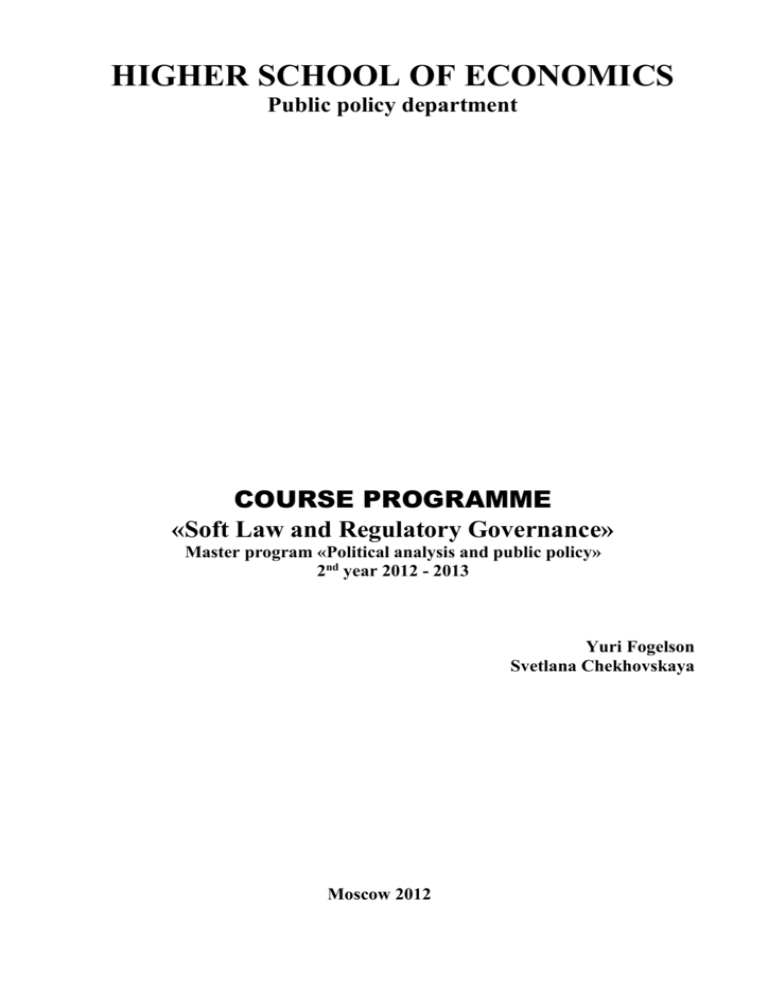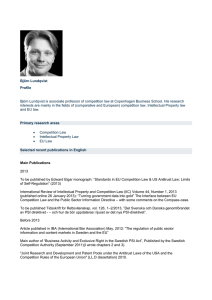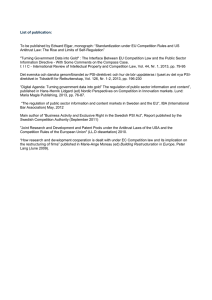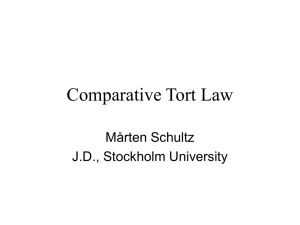Theme2.SOFT LAW
advertisement

HIGHER SCHOOL OF ECONOMICS Public policy department COURSE PROGRAMME «Soft Law and Regulatory Governance» Master program «Political analysis and public policy» 2nd year 2012 - 2013 Yuri Fogelson Svetlana Chekhovskaya Moscow 2012 2 CURRICULUM Theme 1.INTRODUCTION Class 1. (13.09.2012) Introductory lecture (2 hours). Short course introduction, problems of the discipline.Issuing texts for short annotations and glossaries preparation by students.Methodology of studying, literature and glossaries elaboration. Distribution of topics for reports. Methodology of reporting and preparation for seminars. Methodology of students’ activity evaluation and final grading. Class 2.(20.09.2012) Seminar: work with texts and glossaries (4 hours). Discussion of glossaries students prepared. Elaboration of common glossary for its further complementation during other reports preparation and discussion. Class 3.(27.09.2012) Seminar: work with texts and glossaries (4 hours). Short students’ reports on their annotations (5 min) and discussion Theme2.SOFT LAW: ORIGINS OF THE TERM Class 4.(04.10.2012) Lecture (4 hours). Soft law and its communicative function. Western political and legal discourse from Papal revolution (XI) to the end of 70s of the ХХ century: natural law theories, sociological theories of law, legal positivism. Westphalia system and sovereignty .Communicative attributes of law. Social responsibility. Comparison of soft law, hard law and moral obligations. Soft law as a type of law. Soft law and legal certainty. Class 5.(11.10.2012) Seminar: students’ reports (4 hours) 1. 2. 3. 4. Dialectical method of the Middle age lawyers Conception of rationalistic natural law Review of sociological law theories Main principles of the Peace of Westphalia. Westphalia system Class 6.(18.10.2012) Seminar: students’ reports (4 hours) 3 5. 6. 7. 8. Jean Bodin and his concept of sovereignty Gerber Hart’s theory and debates with Lon Fuller Rational legal discourse in works of Alexy and Dworkin Autopoietic law theories Theme3.Instruments and methods of soft law regulations Class 7. (25.10.2012) Lecture (4 hours). EU soft law instruments. Other instruments of soft law: rules of organizations, self-regulation, standards, codes of best practice, resolutions, declarations, etc. Open method of coordination: its implementation in EU and other institutes/organizations based on soft law. Reputation responsibility. Threat of “hardening”. Risks of soft law instruments. END OF THE FIRST MODULE Class 8 (08.11.2012).Seminar: students’ reports (4 hours) 9. Structure of the EU law and necessity in soft law 10. «Naming and shaming» method and method of open coordination 11.Reputation responsibility in В2С relations 12.Reputation responsibility in В2В relations Class 10 (15.11.2012).Seminar: students’ reports (4 hours) 13. Self-regulation as soft law instrument 14.Practice analysis ofЕCHR Guiding principles implementation 15.Practice analysis of ECJ soft law methods 16. Review of resolutions and declarations used as soft law Theme4.Soft law regulation cases Class 10.(22.11.2012) Seminar: students’ reports (4 hours) 17. Soft law of OSCE 18. Soft law of WTO 19.Soft law in corporate relations 20. Cases of soft law regulations on national level Class 11. (29.11.2011) Seminar: students’ reports (4 hours) 21.Cases of soft law regulations on national level 4 22.Standards of financial systems stability 23.Lexmercatoria as soft law 24. Global contract as soft law Examination Bibliography to classes 1 and 2. get prepared for 1. Lili Jiang, An Evaluation of Soft Law as a Method for Regulating Public Procurement from a Trade Perspective, Thesis submitted to the University of Nottingham for the degree of Doctor of Philosophy July 2009 // Электронный ресурс http://etheses.nottingham.ac.uk/700/ 2. Anna Di Robilant Genealogies of Soft Law // The American Journal of Comparative Law. Vol.54 №3, 2006. P.500-501 3. Sahlin-Andersson Kersten Emergent Cross-Sectional Soft Regulation: Dynamics at Play in the Global Compact Initiative In: Soft Law in Governance and Regulation (Ulrika Mörth ed.), Cheltenham, UK - Northampton, MA, USA, Edward Elgar Publishing Ltd, 2004, P.129-154 4. Commission Notice on informal guidance relating to novel questions concerning Articles 81 and 82 of the EC Treaty that arise in individual cases (guidance letters) / OJ C 101, 27.4.2004, p. 78–80 Доступно на электронном ресурсе http://eurlex.europa.eu/LexUriServ/LexUriServ.do?uri=CELEX:52004XC0 427(05):EN:NOT 5. O.A. Ştefan European Competition Soft Law in European Courts: A Matter of Hard Principles, in European Law Journal, 2008, 753 et seq. 6. Ulrika Mörth Introduction In Soft Law in Governance and Regulation Ulrika Mörthed., Cheltenham, UK - Northampton, MA, USA, Edward Elgar Publishing Ltd, 2004 7. Chinkin Christine Normative Development in the International Legal System In: Commitment and Compliance: The Role of NonBinding Norms in the International Legal System, Dinah Shelton (ed.), Oxford, Oxford University Press, 2000, P.21-42 8. Linda Senden Soft Law in European Community Law, Oxford and Portland Oregon, Hart Publishing, 2004 9. Snyder Francis Soft Law and the Institutional Practice in the European Community In: The Construction of Europe. Essays in Honour of Emile Noël (Stephen Martin ed.), Dordrecht-BostonLondon, Kluwer Academic Publisher, 2010 10.Inger Österdahl The ECJ and Soft Law: Who’s afraid of the EU Fundamental Rights Charter? In: Soft Law in Governance and 5 Regulation (Ulrika Mörth ed.), Cheltenham, UK Northampton, MA, USA, Edward Elgar Publishing Ltd, 2004, P.37-61 11.Bruschke J. Deconstructive Arguments in the Legal Sphere: An Analysis of the Fischl/Massey Debate about Critical Legal Studies // Argumentation and Advocacy. Volume: 32. Issue: 1. Publication Year: 1995 12.Van de Kerchove M. Ost F. Legal System between order and disorder. Oxford, 1994 13.Teubner G. (ed.) Autopoietic Law. A New Approach to Law and Society. Berlin; New York, 1988. 14.T. Brandsen, M. Boogers, P. Tops Soft Governance, Hard Consequences: The Ambiguous Status of Unofficial Guidelines, Public Administration Review, July-August 2006 15.M. Trubek and L. Trubek Hard And Soft Law In The Construction Of Social Europe: The Role Of The Open Method Of CoOrdination, European Law Journal, Vol 11, No. 3, May 2005. 16. Martin Marcussen OECD Governance through Soft Law In: Soft Law in Governance and Regulation (Ulrika Mörth ed.), Cheltenham, UK - Northampton, MA, USA, Edward Elgar Publishing Ltd, 2004, P.103-126 17.M. Fredriksson, P. Blomqvist, U. Winblad Conflict and Compliance in Swedish Health Care Governance: Soft Law in the „Shadow of Hierarchy“, Scandinavian Political Studies, 2011 18.Anna Peters and Isabella Parotto. Soft Law as a New Model of Governance: A Legal Perspective // New Gov New Model of Governance, University of Basel. 2006. https://ius.unibas.ch/uploads/publics/3940/20100219145119_4b7e 9757829c2.pdf 19.H. L. A. Hart Positivism and the Separation of Law and Morals. Harvard Law Review 71 (4): 593–629. 20.Lon L. Fuller Positivism and Fidelity to Law — A Reply to Professor Hart. Harvard Law Review 71 (4): 630–672.


